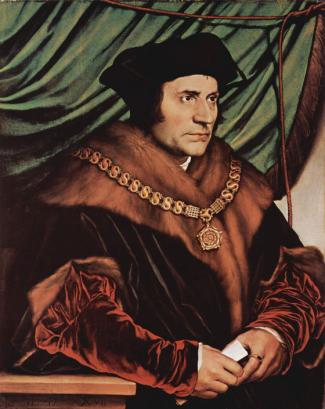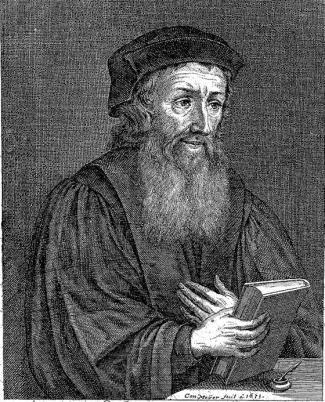The Development of Narrative Texts
Die frühe Neuzeit wurde durch zwei Erscheinungen geprägt: Die Wiederentdeckung antiker Literatur, Kunst und Philosophie sowie die Erweiterung des Weltbildes durch die Entdeckung des Neuen Kontinentes und die neue Einordnung der Welt in das Universum. Das war der Zeitpunkt, um auch über alternative Gesellschaftsformen und politische Systeme nachzudenken – eine Tradition, die im 19. Jh. durch die Literaturgattung des Science Fiction wiederaufgegriffen wurde. Als Folge der Reformation erhielt England eine eigene Bibelübersetzung. Die Tradition des Versepos wurde mit religiöser Thematik fortgeführt.
Early Modern Literature (1500–1660)
The utopian literature of the Renaissance was a product of the humanists' study of ancient Greek works. The term 'utopia' is derived from the Greek terms 'outopia' (= no place) and 'eutopia' (= good place). THOMAS MORUS (SIR THOMAS MOORE, 1478–1535) resumed ideas that the Greek philosopher PLATO expressed in his Republic. In MORUS's novel Utopia (1516) the author conceived an alternative to existing conditions; an ideal state placed on an island that has no contact to other nations. MORUS's model of a functioning community indirectly criticized the economic and social injustice of his time: the miserable living conditions of the urban and rural poor and the resulting social tension.
FRANCIS BACON (1561–1626), also famous for his essays and philosophical works, described the social conditions on the imaginary island of “Bensalem” in a utopian fable entitled New Atlantis (1626).
The underlying motive for utopian literature is the quest for perfection. The line of utopian literature was resumed by science fiction and dystopian literature. Late 19th century science fiction writers, H. G. WELLS (1866–1946; The Time Machine 1895, The War of the Worlds 1898, A Modern Utopia 1905, The Sleeper Awakes 1911) and the French novelist JULES VERNE (1825–1905; Voyage au centre de la Terre 1864, Vingt mille lieues sous les mers 1869, Le Tour du monde en quatre-vingts jours 1873) combined adventure with future developments in science and technology.
Dystopian literature presents a very unpleasant imaginary world by anticipating negative social, political and scientific developments. Examples are:
- ALDOUS HUXLEY, Brave New World (1932),
- ARTHUR KOESTLER, Darkness at Noon (1949),
- GEORGE ORWELL, 1984 (1949),
- RAY BRADBURY, Fahrenheit 451 (1953).
-
THOMAS MORUS (1478 bis 1535)

Directmedia Publishing
Bible Translations in Early Modernity
After translations of parts of the Bible during the Old English Period, the 16th and 17th century brought forth the first complete translations of the Bible into English by the following authors:
- 1382/1388 JOHN WYCLIFFE
- 1525–1531 WILLIAM TYNDALE (who was also an important representative of the Reformation)
- 1535 MILES COVERDALE
- 1611 the Authorized Version, mainly based on TYNDALE's translation with parts from WYCLIFFE's.
The Verse Epic
The Italian Verse Epic reached perfection with DANTE's Divina Commedia (1307–21). In England the development of the Verse Epic continued with EDMUND SPENSER's The Faerie Queene (1589–96), a combination of romance, fairy tale and allegory. It consists of six books describing the adventures of twelve allegorical knights.
JOHN MILTON's Paradise Lost (1642–63), an epic poem in twelve books, dealt with Adam and Eve giving in to Satan's temptation. The sequel Paradise Regained (1671) is about the temptation of Christ in the wilderness. MILTON's epic poems were based on VIRGIL's Aeneis.
-
JOHN WYCLIFFE (1330 bis 1384)


